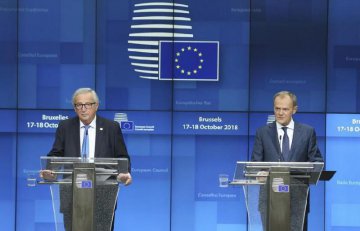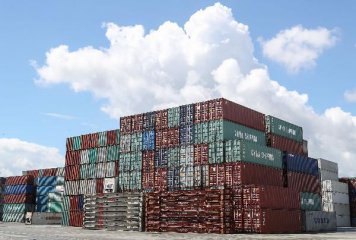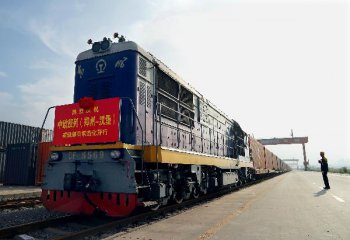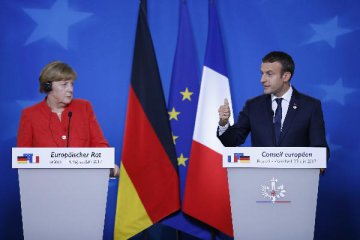
On the southwestern British coast of Somerset, giant excavators are working at a construction site as big as 245 football pitches to house Hinkley Point C's two future reactors.
The ten-year project, dubbed "Britain's first new nuclear power station in a generation," has been proceeding smoothly ahead of the first milestone -- the completion by mid 2019 of the "common raft," or the ground level for the plant to sit upon.
The 14-billion-GBP (18-billion-U.S.-dollar) project, with one-third the investment from China, will create 25,000 jobs during its construction and 900 permanent positions after it begins operation in 2025.
It also helps secure nearly a third of the UK's electricity generation capacity currently coming from nuclear energy. Almost half of Britain's 15 working reactors will be decommissioned by 2025.
The British government approved the Hinkley point C project in 2016 after briefly delaying the decision, paving the way for an enhanced version of the Golden-Era in China-Britain relations, despite some media allegations of a so-called "threat" posed by Chinese investment in Europe with a purported "grand strategy."
Stephen Perry, Chairman of Britain's 48 Group Club, a business association known for initiating an ice-breaking trade mission to China during 1950s, said prejudice against China of more than six decades ago still exists today.
The prejudice, some disregarding even the most basic of facts, could result in Europe missing the great opportunities brought by China's growth, said Perry.
REAL OPPORTUNITIES
In the German central city of Dessau-Rosslau near Berlin, Fahrzeugtechinik Dessau (FTD), a railway locomotive company with about 120 years of history, averted the fate of bankruptcy.
Molinari Rail Systems GmbH, a China-Swiss joint venture of railways, acquired the insolvent firm in November 2016. Jan Harder, the CEO of Molinari, told Xinhua that the SME kept all its 45 employees after the acquisition and has made a comeback as a reliable partner in the German rail industry with more hirings in the past two years.
The CEO denied any political implication from the deal with the Chinese company. "I would not see or confirm any political influence," Harder said, "At the end of the day, the main target of our work is to improve the comfort of passengers in their daily travels."
"We are on a good path," he added.
In Serbia, a formerly state-owned steel plant once on the brink of bankruptcy, has been emboldened after its takeover by Chinese steelmaker HBIS in 2016.
Founded in 1913 in the city of Smederevo, Hesteel Serbia was once the epitome of the country's industrial success. According to Dragan Stevanovic, state secretary at the Serbian ministry of economy, the livelihood of some 20,000 people in the city depends directly or indirectly on Hesteel Serbia.
"When we look from today's perspective, Hesteel (Serbia) has increased profit and income by 77 percent, while the investments are at ... 485 percent compared to the period prior to the purchase," said the state secretary.
"These numbers can in the best possible way illustrate what HBIS means for Smederevo, the whole of Serbia and its government," he said.
BRIDGE, NOT DIVIDE
Chinese investments not only secure and create jobs in Europe but also contribute to reducing the development gap between regions.
Lodz, a central Polish city and a stop of the China-Europe freight transit, has become a bustling logistics hub linking Europe's East with West.
The China Rail Express freight service, a flagship project under the Belt and Road Initiative (BRI), links 48 Chinese cities with 42 cities in 14 European countries as it winds its way across the vast continent.
Made-in-China laptops, mobile phones and textiles are the most popular products arriving in Europe, while European products including fine wines and vehicle parts are shipped to China.
Deputy mayor Krzysztof Piatkowski said Lodz will likely become one of the biggest logistics hubs in Europe thanks to the joint investment from China and Poland, adding the city values its cooperation with China.
In Montenegro, the country's first highway is being built in the terrain-challenged Balkan state so as to link its north and south while reaching inland Europe.
Vatroslav Belan, a government advisor, described the 180-km-long highway as "the road to Europe and the community of the most developed countries."
Supported with Chinese loans and engineering expertise under the BRI, the project has stimulated local growth. The International Monetary Fund (IMF) said "after expanding 2.9 percent in 2016, the economy grew 4.4 percent in 2017, driven by highway construction and a strong tourism season."
But some media still mock the highway as a "debt trap" by China. Included on their list of "debt traps" is the Greek port of Piraeus, now one of the busiest in Europe.
CULTURE DEFICIT
Some news media go so far as to blame Chinese investments for a "weakened and divided Europe."
Professor Kostas Gouliamos, Rector of European University Cyprus,dismissed such accusations: "Chinese investment aims for mutual benefit. There is countless positive effect of Chinese investment in Europe. In view of this, many states and economic areas across Europe look to China as a source of opportunity, investment relations and growth."
The Chinese investment "can be a source of jobs, growth and even technological progress," he said.
Francesco Maringio, an Italian China expert based in Bologna, said China offers "a new way of cooperation" with Europe and the world in areas ranging from trade and economy to cultural, political and institutional exchanges.
In comparison to unilateral, protectionist policies, China offers a chance for "peaceful and common prosperity" among countries, he said.
Perry, the 48 Group Club head, said Chinese policies are deeply rooted in Chinese culture and it will take decades and generations to remove the prejudice and what he called the "cultural deficit" between the West and China.
"The greatest challenge of the ice breakers in the next phase is to help the world understand China," he said, "and also, I think help China understand the world."
(Xinhua reporters Zhai Wei, Wang Zichen, Han Chong in Brussels, Zhu Sheng in Berlin, Wang HuiJuan in Belgrade, Han Mei in Warsaw, Zhang Zhang in Nicosia, Li Jie in Rome, Yuan Liang in Budapest also contributed to this story.)




















Latest comments